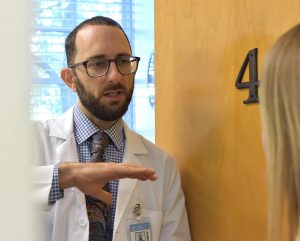The UNC Hearing and Communication Center (UNC HCC) has opened an outpatient vestibular clinic to assess dizziness and vertigo—the first of its kind in the UNC Health Care system.

Led by Philip Griffin, AuD, the clinic will provide a variety of services related to the vestibular system, a sensory system that contributes to a sense of balance and spatial orientation.
The clinic, which launched in September, aims to serve North Carolinians, in particular people who have long-suffered from bouts of dizziness or vertigo. According to data from the American Speech-Language-Hearing Association, approximately 40 percent of people in the United States will experience dizziness or balance issues during their lifetime.
“The inner ear plays into this sense of being able to hold yourself up, to balance yourself, and to move around in the world safely,” Griffin said. “It’s this mysterious sense and has this mysterious effect on us that people don’t even really know about. That’s fascinating in and of itself.”
Issues of dizziness and balance often stem from issues with the vestibular system, which is the primary sensory system that allows humans to balance and provide spatial orientation.
Often, aging populations are more at risk to have a debilitating dizziness experience, leading to a fall. “Falls are one of the most dangerous things that can happen to an older person,” Griffin said.
“The vestibular system is highly connected to our entire brain and how it operates. The system is in a really interesting part of the brain; it talks to so many different parts of the brain that communicate with different parts of the body.” Griffin said. “When something goes wrong it can be sudden, and it can be devastating in many different ways.”
Its symptoms can vary greatly, requiring a trained and specialized practitioner for diagnosis and treatment. Patients often describe symptoms of having a fuzzy head, eyes that fail to focus, spinning, or lightheadedness. Griffin explained that these descriptors are in line with issues with the vestibular system and that they are helpful cues for audiologists to map out an assessment and plan of what to do next. Griffin plans to work closely with patients’ primary and specialty physicians. “Vertigo assessment is always a team approach; audiology is just one part of the larger assessment and management team.”
With the launch of the vestibular clinic, Griffin hopes to bring the highest possible level of diagnosis, assessment, and multi-level management to North Carolinians who have problems with dizziness and vertigo.
In addition to benefitting patients, the clinic will allow audiology students at the UNC School of Medicine to benefit from hands-on experience in a clinical setting. The clinic’s audiologists work alongside AuD students to train the next generation of audiologists.
“To train an audiology student to become a full-fledged audiologist, you have to train them in the many different areas of audiology,” Griffin said. The Doctor of Audiology program is ranked fourth in the nation according to rankings from U.S. News & World Report.
Stephanie Sjoblad, AuD, and clinical director for the UNC HCC, said the audiology program will celebrate its 50th anniversary in 2019.
“It’s especially exciting to see the expansion of our clinical services,” Sjoblad said. “We’ve come a long way in the past 15 years since we moved off campus to a more accessible, community-based hearing center. Audiology is an evolving field and whether working to diagnose and treat hearing, tinnitus or balance issues, our goal is to offer comprehensive, evidence-based services with care and compassion while offering an exemplary clinical education to our students.”
Griffin is committed to serving patients in the Triangle and beyond diagnose, assess, and manage their dizziness issues and teach the next generation of audiologists.
Griffin is a 2007 graduate of the Doctor of Audiology program, housed in the UNC School of Medicine’s Division of Speech and Hearing Sciences. The division is part of the Department of Allied Health Sciences.
The UNC HCC is located at 6015 Farrington Rd., Suite #103, in Chapel Hill. To schedule an appointment, call (919) 493-7980 or visit its website.